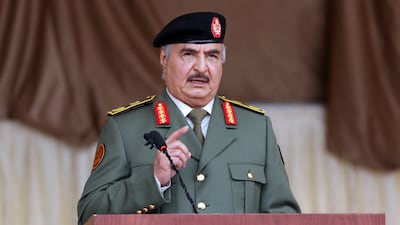Eastern Libyan commander Khalifa Haftar paved the way to stand as president in a possible December election on Wednesday, announcing he would step down from his military role for three months.
In a statement, Field Marshal Haftar said he had chosen an interim replacement as head of the self-proclaimed Libyan National Army until December 24, the date of the legislative and presidential vote.
Libyan media said the move opened the way for Field Marshal Haftar to run as a presidential candidate under a controversial new law.
National elections have been promoted as a way to end Libya’s decade-long crisis, but bitter arguments over legitimacy may unravel the months-long peace process.
The election was mandated last year by the Libyan Political Dialogue Forum, a UN-selected assembly that set a road map for peace in Libya, a major oil producer, through the installation of a unity government and a nationwide vote.
The Libyan parliament passed a vote of no confidence in the unity government this week, another blow to UN-backed peace efforts.

Eighty-nine of the 113 members who attended the session in the eastern city of Tobruk voted to withdraw support from the Tripoli-based administration of interim Prime Minister Abdul Hamid Dbeibah.
On Wednesday, Germany, which has played a leading role in diplomacy to end Libya’s civil war, called for the elections to go ahead.
“The international community expects Libyan officials in Tripoli and the rest of the country to work for presidential and legislative elections to take place as scheduled on December 24,” German Foreign Minister Heiko Maas said at a high-level meeting on Libya at the UN of which he was co-chairman.
Mr Maas also called for renewed efforts to remove foreign mercenaries from Libya.
The UN estimates there are more than 20,000 mercenaries, including Russians, Syrians, Chadians and Sudanese, in Libya, as well as foreign troops, most of them Turkish.

